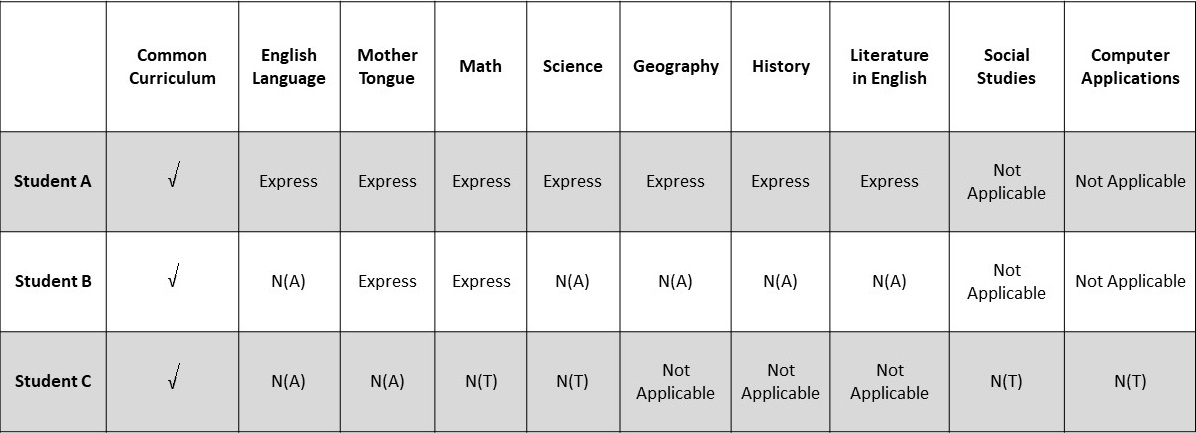Full Subject Based Banding (FSBB)
Introduction

 Subject-Based Banding (SBB) was piloted in twelve secondary schools in 2014, to provide greater flexibility in lower secondary subject combinations. Under SBB, students who perform well in certain subjects would be given the opportunity to offer them at a higher level.
Subject-Based Banding (SBB) was piloted in twelve secondary schools in 2014, to provide greater flexibility in lower secondary subject combinations. Under SBB, students who perform well in certain subjects would be given the opportunity to offer them at a higher level.
Six years on, MOE is piloting Full Subject Based Banding (FSBB) in 2020, and it will be introduced progressively to all secondary schools by 2024.
When FSBB is fully implemented, students from the Express, Normal (Academic), and Normal (Technical) streams will be merged into a single course of study. The video below explains in greater detail what FSBB is all about:
We are delighted to announce that GESS has been chosen to be one of the pilot schools for FSBB in 2020.
How does FSBB work?
 Under FSBB, all the subjects students offer are categorised into two groups – those in the Common Curriculum, and those offered as SBB subjects at different levels.
Under FSBB, all the subjects students offer are categorised into two groups – those in the Common Curriculum, and those offered as SBB subjects at different levels.
The Common Curriculum comprises the following subjects, which are taught to the entire form class:
- Art;
- Character and Citizenship Education (CCE);
- Design & Technology (D&T);
- Food and Consumer Education (FCE);
- Music; and
- Physical Education (PE)
The following are the SBB subjects offered in GESS :
- English Language;
- Mother Tongue Languages;
- Mathematics;
- Science;
- Geography;
- History;
- Literature in English
During SBB lessons, students are offered in ability-banded classes — Express, N(A), and N(T).
So how does this all work? To illustrate, let us take an example of three students from the same form class, who offer the SBB subjects at different levels:

In this case, we can see that while all three students attend the same Common Curriculum lessons, they will go to different classes for the other subjects’ lessons. This may involve them ‘merging’ with students from another form class.
FSBB @ GESS
Let’s hear a couple of our teachers’ thoughts about FSBB, and how the school has been preparing for the pilot:

<p style="text-align:right;">Up</p>
FSBB FAQs
A. Curriculum Demands of Reorganised Form Classes
-
- The common curriculum comprises Music, Art, D&T, PE, FCE and CCE. It is designed to ensure accessibility to all students. There would be common curriculum coverage and assessment tasks and rubrics that will allow all students to meet each subject’s requirements.
-
- It takes time to adjust to the demands of a higher-level subject, so students should allow themselves a full two years before deciding if they wish to continue offering the subject at a higher level in the upper secondary years. Interest in the subject is more important than the marks obtained, so students should not use marks as an indicator of their ability to cope with the subject.
- The school would involve the student’s parents and teachers when such a request is made. The student and his/her parents can make the final decision to continue or drop the subject, as long as they are aware of the impact on the student’s post-secondary progression.
-
- The school has distinctive signature programmes that will stretch our able students in the form of national and international competitions such as the Math and Science Olympiads, the Queen’s Commonwealth Essay Competition, among others. The school also has an enrichment programme with Raffles Institution to nurture the passion of our top Science students.
-
- Streaming for different subject combinations will take place based on students’ Sec 2 overall results. Students will be placed in courses that best fit their academic ability and aspirations for their upper secondary education.
-
- At the moment, there are no changes to the national exams for FSBB students. Students will register for their subjects according to the stream that they offer these subjects at, eg. Express Mathematics, N(A) Science etc.
B. Social mixing in reorganised Form Classes
-
- Students from different streams are in the same Form Class for the Common Curriculum subjects. The outcomes of a FSBB classroom are (a) to foster a sense of belonging in all students, (b) to nurture students’ strengths and potential, and (c) to appreciate diversity. Over time, with established classroom routines and expectations put in place, students will form strong bonds that will enable them to help one another in the learning process.
- For the other subjects, students will be with peers of the same stream and those who have done well to qualify for a SBB subject.
-
- It is important for students to feel accepted, safe and empowered in the classroom. Through our emphasis on positive teacher-student relationships as well as peer support and relationships, students will be well supported emotionally and learn to adopt the right mindsets and skills when engaging with one another.
- There are also CCAs and many school-wide activities such as cohort camps, Learning Journeys and sports-based events (Sports Fiesta, Cross-Country) that enable students to form strong friendships regardless of backgrounds.
C. Timetabling matters concerning reorganised Form Classes
-
- Students will stay in their Form Classes for all subjects in the Common Curriculum. For the other subjects, they will move to different venues, according to the level of each subject they are offering. These will be indicated clearly on the timetable.
- Lessons will begin at 7:45am after flag-raising and students will end at different timings depending on their subject combinations. CCAs are on Tuesday and Friday afternoons.
-
- Our current system already ensures that students are familiar with the need to move from one venue to another for different lessons. Lessons will end promptly on the bell, which will be the cue for students and teachers to move to their next venues.
D. Curriculum demands of higher-level Humanities subjects
-
- Studying the Humanities at a higher level enables students to be more holistic in their cognitive development and appreciation of the world.
- Geography enables students to gain insights into contemporary issues of environmental and human concerns, as well as an understanding of present and future resources and societal challenges.
- Literature helps students become critical readers, convincing communicators and empathetic thinkers.
-
- For Geography, the N(A) syllabus is a subset of the Express syllabus. Both courses are grounded in the concepts of scale, place and space, with an issues-based framework adopted in the teaching and learning.
- For Literature, the N(A) syllabus is a subset of the Express syllabus. Both courses focus on the 3 genres of prose, poetry and drama. The texts for these genres may be differentiated between the courses to manage the reading load of the students.
-
- Students are encouraged to give themselves time to adapt to the demands of a higher-level subject, and will be encouraged to persevere.
- The school would involve the student’s parents and teachers when such a request is made. The student and his/her parents can make the final decision to continue or drop the subject, as long as they are aware of the impact on the student’s post-secondary progression.
-
- The criteria for promotion and retention remain unchanged. The higher-level Humanities subject(s) offered will be considered among the student’s suite of subjects.
-
- There will be support provided for students offering higher-level Humanities subjects. This can be in the form of bridging lessons, consultation sessions or briefings to guide students to adjust to the greater demands.
-
- Yes, students are allowed to offer both Geography and Literature at a higher level. This decision should be guided by their passion for the subjects, as well as their overall ability to cope with the other subjects and non-academic commitments.
-
- At the end of Sec 2, students who meet the criteria for out-of-stream (OSS) subjects at the upper secondary levels can offer higher-level Humanities.
-
- The criteria for lateral transfer are independent of whether a student offers higher-level Humanities, although offering subjects at a higher level is an indication of his/her ability to cope with higher academic demands.
E. Timetabling matters concerning higher-level Humanities subjects
-
- The number of periods remains the same.
-
- Depending on the number of students who qualify for SBB Geography or Literature, you may be in a combined class with the Express students, or you may be in a separate class with only N(A) students.

